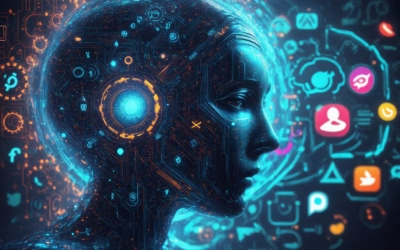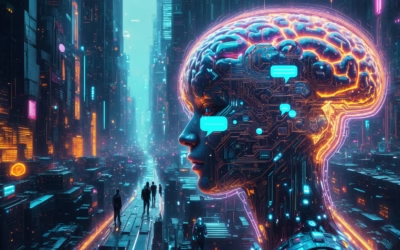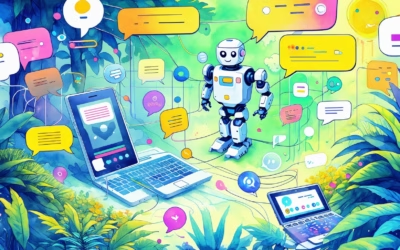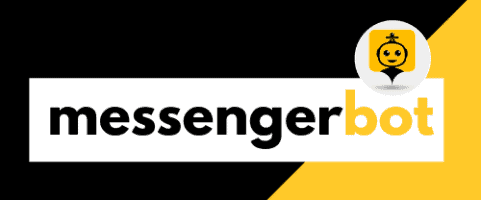Key Takeaways
- Revolutionizing Patient Care: Medical chatbots enhance patient engagement by providing immediate support and accurate health information.
- 24/7 Accessibility: These AI chatbots are available around the clock, ensuring patients can access healthcare assistance anytime.
- Personalized Interactions: Advanced medical chatbots utilize AI to tailor responses based on individual patient data, improving health outcomes.
- Cost-Effective Solutions: Free medical AI tools, like Ada Health and Buoy Health, provide valuable health insights without any financial burden.
- Streamlined Communication: Chatbots reduce wait times and improve operational efficiency by automating routine healthcare processes.
- Future Potential: The integration of AI in healthcare chatbots will continue to evolve, enhancing capabilities and expanding their role in patient care.
In today’s rapidly evolving healthcare landscape, the emergence of medical chatbots has revolutionized the way patients interact with healthcare providers. These AI chatbots for healthcare serve as virtual assistants, offering immediate support and information, which enhances patient engagement and streamlines communication. This article delves into the world of medical AI chatbots, exploring their functionalities, the best options available, and their significant impact on the healthcare industry. We will answer critical questions such as, “Is there a medical chatbot?” and “What is the best medical AI?” while also examining free solutions that are transforming patient care. Additionally, we will highlight real-world chatbot use cases in healthcare and discuss the numerous benefits of implementing these innovative technologies. Join us as we uncover the potential of chatbot technology in healthcare and its future in improving health outcomes.
Is there a medical chatbot?
Yes, there are several medical chatbots available that utilize advanced artificial intelligence to assist in healthcare. One prominent example is the IBM Watson Assistant, which leverages generative AI and custom-built large language models to provide comprehensive healthcare support.
Overview of medical chatbots and their functionalities
Medical chatbots are designed to enhance patient engagement and streamline healthcare processes. Key features of medical chatbots include:
- Patient Interaction: Medical chatbots can engage with patients by answering frequently asked questions, providing information about symptoms, and guiding users through healthcare processes.
- Data Integration: These chatbots can access and analyze vast amounts of health information, including patient data and medical history, allowing them to provide personalized responses and recommendations.
- 24/7 Availability: Unlike traditional healthcare services, medical chatbots are available around the clock, ensuring that patients can receive assistance whenever they need it.
- Handling Complex Queries: Advanced chatbots are designed to tackle unexpected queries, offering insights based on a wealth of medical knowledge and data.
- Improving Patient Outcomes: By facilitating timely communication and providing accurate information, medical chatbots can enhance patient engagement and adherence to treatment plans.
In addition to IBM Watson Assistant, other notable medical chatbots include Ada Health, Buoy Health, and Babylon Health, each offering unique features tailored to improve patient care and streamline healthcare services. For further reading on the impact of AI in healthcare, refer to studies published in journals such as the Journal of Medical Internet Research and the International Journal of Medical Informatics, which explore the efficacy and future potential of medical chatbots in clinical settings.
The role of AI in medical chatbots
Artificial intelligence plays a crucial role in the functionality and effectiveness of medical chatbots. By utilizing machine learning algorithms and natural language processing, these chatbots can understand and respond to user inquiries with a high degree of accuracy. The integration of AI allows for:
- Personalized Interactions: AI enables chatbots to tailor responses based on individual patient data, enhancing the relevance of the information provided.
- Continuous Learning: Medical AI chatbots improve over time by learning from interactions, which helps them refine their responses and better serve patients.
- Scalability: AI-driven chatbots can handle a large volume of inquiries simultaneously, making them an efficient solution for healthcare providers.
- Data-Driven Insights: By analyzing user interactions, AI can identify trends and patterns that can inform healthcare strategies and improve patient outcomes.
As the healthcare industry continues to evolve, the use of AI in medical chatbots is expected to expand, offering even more sophisticated solutions for patient care and engagement. For more insights into the benefits of chatbots in healthcare, check out our article on the comprehensive benefits of chatbots in healthcare.
What is the best medical chatbot?
When considering the best medical chatbots, several options stand out for their innovative features and user-friendly interfaces. Here are some of the most promising health chatbots currently available:
- Buoy Health: This chatbot uses an interactive symptom checker that guides users through a series of questions to help identify potential health issues. It is designed to provide personalized health information and recommendations based on user responses.
- Ada: Ada is an AI-powered health companion that allows users to input symptoms and receive tailored health assessments. Its extensive medical database and machine learning capabilities enable it to provide accurate information and advice.
- Florence: This chatbot focuses on medication management, reminding users to take their medications and providing information about drug interactions. It aims to improve adherence to treatment plans.
- OneRemission: Targeted at cancer patients, OneRemission offers personalized support by providing information on treatment options, symptom management, and emotional support resources.
- Youper: This mental health chatbot utilizes AI to engage users in conversations about their feelings and mental well-being. It offers tools for mood tracking and coping strategies, making it a valuable resource for those seeking mental health support.
- Healthily: This chatbot combines symptom checking with health information and lifestyle advice. It empowers users to take charge of their health by providing actionable insights based on their input.
- Sensely: Sensely features a virtual medical assistant named Molly, who can assess symptoms through speech, text, images, and videos. This multi-modal approach enhances user engagement and provides a comprehensive assessment of health concerns.
- Infermedica: Utilizing machine learning technology, Infermedica operates the Symptomatik symptom checker chatbot. It helps users understand their symptoms and directs them to appropriate care based on their input.
These chatbots represent the forefront of digital health technology, leveraging AI and machine learning to provide users with accurate, personalized health information. For further reading on the effectiveness of medical chatbots, refer to studies published in journals such as the Journal of Medical Internet Research and the International Journal of Medical Informatics, which highlight their impact on patient engagement and healthcare delivery.
Features that define the best medical AI chatbot
The best medical AI chatbots share several key features that enhance their functionality and user experience:
- Personalization: Effective medical chatbots tailor their responses based on user input, providing personalized health information and recommendations.
- Integration with healthcare systems: The best chatbots can seamlessly integrate with existing healthcare systems, allowing for smooth data exchange and improved patient care.
- Real-time assistance: Users benefit from immediate responses to their inquiries, making chatbots a valuable resource for urgent health questions.
- Data security and privacy: Top medical chatbots prioritize user privacy and comply with healthcare regulations, ensuring that sensitive information is protected.
- Multilingual capabilities: To cater to a diverse audience, many leading chatbots offer support in multiple languages, enhancing accessibility.
These features not only improve user satisfaction but also contribute to the overall effectiveness of chatbots in healthcare settings. For more insights on the benefits of chatbots in healthcare, explore our detailed analysis.
Is There a Medical Version of ChatGPT?
As the demand for advanced healthcare solutions grows, the emergence of AI medical chatbots similar to ChatGPT has become increasingly relevant. These medical AI chatbots leverage artificial intelligence to provide tailored responses and support in various healthcare settings. They are designed to assist both healthcare professionals and patients, enhancing communication and streamlining processes.
Exploring AI Medical Chatbots Similar to ChatGPT
Several platforms have developed AI chatbots specifically for the medical field, each offering unique functionalities:
- BastionGPT: This platform is tailored for healthcare professionals, focusing on medical compliance and rigor. It features document uploads, meeting transcriptions, and drug interaction checks, ensuring that providers have reliable information at their fingertips.
- DeepCura AI Medical Scribe: A customizable assistant that integrates with major Electronic Health Record (EHR) systems, enhancing clinical documentation and workflow efficiency.
- CompliantChatGPT: This platform allows for HIPAA-compliant use of OpenAI’s models, ensuring patient confidentiality while utilizing AI capabilities.
- Med-PaLM: Developed by Google, this AI chatbot is specifically designed for medical applications, providing reliable information that compares favorably with clinician responses.
- Dr. ChatGpt: A personal AI medical chatbot that offers instant answers regarding symptoms, diagnoses, and treatments, making healthcare information more accessible.
These medical chatbots exemplify the innovative use of AI in healthcare, showcasing the potential for improved patient engagement and operational efficiency.
Use Cases of ChatGPT Technology in Healthcare
The integration of ChatGPT technology in healthcare has led to numerous practical applications:
- Medical Summaries: AI chatbots can efficiently summarize patient histories, aiding healthcare providers in making informed decisions.
- Staying Updated: They provide access to the latest medical research, helping professionals remain current with advancements in their fields.
- Clinical Paperwork: AI chatbots assist in generating patient notes and essential documents, streamlining administrative tasks.
- Patient Education: These tools help patients understand their conditions and treatment options, fostering better health literacy.
- Medical Education: AI chatbots support medical students with learning resources and exam preparation, enhancing their educational experience.
By utilizing chatbot technology in healthcare, these AI-driven tools not only improve efficiency but also enhance the overall patient experience, making healthcare more accessible and effective.
Is there a free medical AI?
Yes, there are several free medical AI tools available, with the Docus AI Symptom Checker being one of the most notable. This tool offers users quick and accurate health insights without any cost, making it accessible to everyone. In addition to Docus AI, other free medical AI applications include:
- Ada Health: This AI-powered health companion helps users assess their symptoms and provides personalized health information based on a comprehensive database of medical knowledge. It is user-friendly and designed for individuals seeking immediate health insights.
- Buoy Health: Buoy uses AI to guide users through their symptoms and recommend appropriate next steps. It is particularly useful for those unsure about their health concerns and provides tailored advice based on user input.
- WebMD Symptom Checker: While not strictly an AI, WebMD’s tool utilizes algorithms to help users identify potential health issues based on their symptoms. It offers a wealth of information and is widely recognized for its reliability.
- K Health: This app combines AI with real doctor insights, allowing users to chat with a doctor for free after answering a series of questions about their symptoms. It provides a blend of AI-driven analysis and human expertise.
These tools leverage advanced algorithms and extensive medical databases to provide users with reliable health information. According to a study published in the Journal of Medical Internet Research, AI symptom checkers can significantly enhance patient engagement and improve health outcomes by providing timely information (Wang et al., 2020).
For anyone seeking free medical advice, these AI tools represent a valuable resource, offering immediate access to health insights without the need for a doctor’s visit.
Benefits of using free medical AI chatbots
Utilizing free medical AI chatbots offers numerous advantages for users seeking health information and support. Here are some key benefits:
- Accessibility: Free medical AI chatbots are available 24/7, allowing users to access health information anytime, anywhere, without the constraints of traditional healthcare services.
- Cost-effective: These tools provide valuable health insights without any financial burden, making healthcare more affordable for everyone.
- Immediate responses: Users can receive instant feedback on their symptoms, helping them make informed decisions about their health without waiting for a doctor’s appointment.
- Personalized guidance: Many medical AI chatbots offer tailored advice based on user input, enhancing the relevance of the information provided.
- Increased engagement: By providing interactive and user-friendly interfaces, these chatbots encourage users to engage more actively with their health, leading to better health literacy.
Overall, free medical AI chatbots serve as an essential resource in the healthcare landscape, empowering users with the information they need to manage their health effectively.
What is the best medical AI?
When evaluating the best medical AI solutions, it’s essential to consider various factors that contribute to their effectiveness in enhancing healthcare delivery. The landscape of medical AI is rapidly evolving, with numerous platforms emerging to assist healthcare professionals in their daily tasks. Below, I will highlight some of the leading medical AI tools available in 2024, showcasing their unique functionalities and contributions to the healthcare sector.
The Best Medical AI Tools for Health Professionals in 2024
- Consensus AI: This innovative AI search engine enables healthcare professionals to efficiently locate and comprehend research papers across diverse medical fields. By utilizing natural language processing, Consensus AI streamlines the research process, allowing for quicker access to evidence-based information, which is crucial for informed decision-making in clinical practice. (Source: Consensus AI, 2024)
- Merative (formerly IBM Watson Health): Merative leverages advanced AI algorithms to analyze vast amounts of healthcare data, providing actionable insights that enhance patient care. Its capabilities include predictive analytics and personalized treatment recommendations, making it a valuable tool for clinicians aiming to improve patient outcomes. (Source: Merative, 2024)
- Viz.ai: This AI platform specializes in stroke detection and triage, utilizing deep learning to analyze CT scans and alert healthcare providers in real-time. By facilitating faster diagnosis and treatment, Viz.ai significantly improves patient prognosis in acute care settings. (Source: Viz.ai, 2024)
- Regard: Regard employs AI to assist in clinical documentation and coding, reducing administrative burdens for healthcare providers. Its machine learning capabilities help ensure accurate billing and compliance, allowing clinicians to focus more on patient care rather than paperwork. (Source: Regard, 2024)
- Twill: Twill offers a patient-centric AI platform that supports mental health management through personalized care plans and real-time monitoring. By integrating behavioral health data, Twill enhances the overall patient experience and outcomes in mental health treatment. (Source: Twill, 2024)
Key Features of the Best Medical AI Chatbot Free
The best medical AI chatbots, particularly those available for free, share several key features that enhance their utility in healthcare settings. These features include:
- Natural Language Processing (NLP): This allows the chatbot to understand and respond to user inquiries in a conversational manner, making interactions more intuitive.
- 24/7 Availability: Medical chatbots are available around the clock, providing immediate assistance to patients and healthcare providers without the need for human intervention.
- Integration with Healthcare Systems: The ability to connect with electronic health records (EHR) and other medical databases ensures that chatbots can provide accurate and relevant information.
- Personalized Interactions: Advanced AI chatbots can tailor responses based on user data, enhancing the patient experience and improving engagement.
- Data Security and Compliance: Ensuring patient data is handled securely and in compliance with regulations such as HIPAA is crucial for any medical AI chatbot.
These features not only improve patient engagement but also streamline workflows for healthcare providers, making medical AI chatbots an invaluable asset in the healthcare industry. For more insights on the benefits of chatbots in healthcare, check out this resource.
What is an example of a healthcare chatbot?
An example of a healthcare chatbot is Molly, a virtual medical assistant designed to enhance patient engagement and streamline healthcare access. Molly utilizes advanced artificial intelligence to assess user symptoms through various interaction methods, including speech, text, images, and video.
Key features of Molly include:
- Symptom Assessment: Users can describe their symptoms, and Molly analyzes this information to suggest potential diagnoses. This process is supported by machine learning algorithms that continuously improve accuracy based on user interactions.
- Triage System: Molly employs a colour-coded triage system to indicate the urgency of the suggested diagnoses. This helps users understand the severity of their symptoms and whether they should seek immediate medical attention.
- User-Friendly Interface: The chatbot’s human-like avatar enhances user experience, making interactions feel more personal and engaging.
- Integration with Healthcare Systems: Molly can connect users to relevant healthcare resources, including appointment scheduling and telehealth services, thereby facilitating seamless access to care.
Recent studies indicate that healthcare chatbots like Molly can significantly improve patient outcomes by providing timely information and reducing the burden on healthcare professionals (Source: NCBI, 2023). As the use of AI in healthcare continues to grow, chatbots are becoming essential tools for enhancing patient communication and care delivery (Source: Journal of Medical Internet Research, 2023).
Chatbot use cases in healthcare settings
Healthcare chatbots are being deployed in various settings to improve efficiency and patient care. Here are some notable chatbot use cases in healthcare:
- Patient Screening: Chatbots can conduct initial screenings by asking patients about their symptoms and medical history, helping healthcare providers prioritize cases based on urgency.
- Appointment Scheduling: Many healthcare facilities utilize chatbots to manage appointment bookings, reducing administrative workload and improving patient access to services.
- Medication Reminders: Chatbots can send reminders to patients about their medication schedules, ensuring adherence and improving health outcomes.
- Telehealth Support: AI chatbots facilitate telehealth consultations by guiding patients through the process and providing necessary information before their virtual appointments.
As the healthcare industry continues to embrace chatbot technology in healthcare, these applications are expected to expand, further enhancing patient engagement and operational efficiency.
Benefits of Chatbots in Healthcare
Chatbots in healthcare offer a multitude of advantages that enhance patient care, streamline operations, and improve overall efficiency. By integrating medical chatbots into healthcare systems, providers can significantly reduce wait times, improve patient engagement, and ensure that critical information is readily available. Here are some key benefits:
- 24/7 Availability: Chatbots can operate around the clock, providing patients with immediate responses to their inquiries, scheduling appointments, and offering medical advice without the need for human intervention.
- Cost Efficiency: Implementing a chatbot for healthcare can reduce operational costs by minimizing the need for extensive customer service teams. This allows healthcare providers to allocate resources more effectively.
- Improved Patient Engagement: Chatbots can facilitate personalized communication, reminding patients about medications, follow-up appointments, and providing health tips, which enhances patient adherence to treatment plans.
- Data Collection and Analysis: Healthcare chatbots can gather valuable patient data, which can be analyzed to improve services and tailor healthcare offerings to meet patient needs more effectively.
Advantages of Implementing Chatbots for Healthcare
The implementation of medical AI chatbots brings several specific advantages to healthcare settings:
- Streamlined Processes: By automating routine tasks such as appointment scheduling and patient triage, chatbots free up healthcare professionals to focus on more complex patient care tasks.
- Enhanced Accessibility: Healthcare chatbots can provide information in multiple languages, making healthcare services more accessible to diverse populations.
- Reduction in Human Error: Automated responses reduce the likelihood of miscommunication and errors that can occur in human interactions, ensuring that patients receive accurate information.
- Integration with Existing Systems: Many chatbots can be integrated with electronic health records (EHRs) and other healthcare systems, allowing for seamless data sharing and improved patient management.
Future Trends in Chatbot Technology in Healthcare
The future of chatbot technology in healthcare looks promising, with several trends expected to shape its evolution:
- Increased Use of AI and Machine Learning: As AI medical chatbots become more sophisticated, they will be able to provide more personalized and accurate responses based on patient history and preferences.
- Telehealth Integration: The integration of chatbots with telehealth platforms will enhance remote patient monitoring and virtual consultations, making healthcare more efficient and accessible.
- Focus on Mental Health: There is a growing trend towards using chatbots to support mental health services, providing users with immediate access to resources and support.
- Regulatory Compliance: As the use of chatbots in healthcare expands, adherence to regulations such as HIPAA will become increasingly important, ensuring patient data privacy and security.







